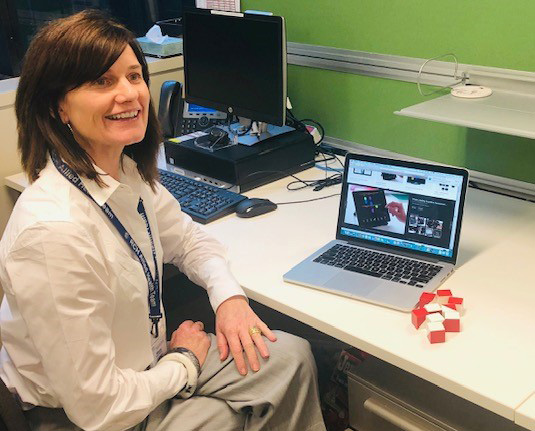






From diagnosis to treatment, survivorship and palliative care, the experience of every patient with cancer is different; effects can be physical, psychological, financial and social. Navigating through encompasses family, friends, medical professionals, health service staff and many others along the way.
The Victorian Comprehensive Cancer Centre (VCCC) is working with patients and carers, as well as professionals in psycho-oncology, supportive care, cancer education and palliative care to support opportunities for improved care and outcomes for patients. The VCCC Building Connectivity Program provides support mechanisms to accelerate innovation through working groups and capacity building initiatives.
Associate Professor Anna Boltong, Associate Director of the VCCC said through the alliance member organisations, research is addressing critical service gaps. She said, “The collective expertise of the VCCC alliance, including our seven hospital members, means we can discover, create and produce evidence-based solutions to effect best practice outcomes across Victoria’s cancer care system.”
Two of the VCCC supported capacity building initiatives will gain a better understanding of how patient-reported outcomes can be integrated into routine care.
Internationally, there is a growing need for patient-reported outcomes to be collected in a systematic way. “Evidence from controlled trials indicates clinical benefits associated with routine monitoring, especially when patient self-reports are combined with timely follow-up and evidence-based care. However, there is little consensus on the purpose and aims of routine monitoring systems and studies of implementation in real world oncology settings are scarce,” said Associate Professor Karla Gough from the Peter MacCallum Cancer Centre and University of Melbourne.
“Understanding system requirements from the perspective of key stakeholders across the VCCC alliance will ensure monitoring systems are designed to optimise patient care and be compatible with the needs of patients, clinicians and organisations.”
From systematically collecting to storing and analysing data, Dr Ruwani Mendis from Western Health is developing a database to record patient-reported outcomes. She said, “Initially we will work with patients with advanced lung cancer to understand trends and assess service provision. Patients with lung cancer have a high symptom burden and often deal with more psychological distress compared to patients with other types of cancer.
“The aim for the database is to include patient-reported outcome data for lung cancer from multiple VCCC sites, enabling cross sectional and longitudinal analysis to make comparisons, identify needs, learn from each other and allocate resources strategically.”

Associate Professor Maria McCarthy from the Royal Children’s Hospital, Murdoch Children’s Research Institute and University of Melbourne
Extremely high survival rates for Acute Lymphoblastic Leukaemia (ALL), the most common childhood cancer, have been achieved with intensive chemotherapy regimens, including targeting the central nervous system.
However, Associate Professor Maria McCarthy from the Royal Children’s Hospital, Murdoch Children’s Research Institute and University of Melbourne says there is an increased focus on the ‘cost’ of this cure. “There is robust evidence that shows a subset of young survivors experience cognitive late effects, which can cause thinking and behavioural difficulties, potentially disrupting learning abilities,” she said.
“We want to put into place an evidence-informed approach to psycho-oncology services for children following ALL treatment. Our approach will be to develop a blueprint for identifying community services and online resources required to meet the needs of patients and their carers, such as mental health services, education liaison or parent-based support.”
This capacity building initiative will provide a foundation for generating psycho-oncology end-of-treatment roadmaps for other diseases.
Dr David Kok is a radiation oncologist at the Peter MacCallum Cancer Centre and a co-convener of the Master of Cancer Sciences, developed by the VCCC in collaboration with the University of Melbourne.
Dr Kok has introduced new approaches to delivering cancer education in an online environment that emphasises student engagement and is now looking to apply this in a palliative care module. “Palliative care is a rapidly growing discipline with expanding clinical services that have outpaced educational infrastructure. Access to high-quality communication training that prepares practitioners for sensitive, end-of-life discussions is currently very limited,” he said.
“We are designing a world-first virtual reality simulation model that will train practitioners all over the world in palliative care communication and will also introduce them to the important key concepts about shared care, pain management and end-of-life care. The program will be accessible, scalable and interactive, catering to a broad audience and paving the way for future educational simulations.”
Understanding and improving the patient journey involves posing important research and practice questions, information gathering, developing relevant platforms and being diligent and fulsome about dissemination, education and translation.
“We are delighted to be supporting these initiatives; making substantive impacts on the patient journey with patient contribution. Best practice is accomplished through consolidation and resource sharing amongst VCCC alliance members, our collaboration partners, patients and people affected by cancer,” Associate Professor Boltong said.
“The VCCC is greatest as the sum of all parts, these initiatives will capitalise on our member’s expertise and our community’s insights to deliver evidence-based, patient-first outcomes to the benefit of all.”
The VCCC Building Connectivity Program is supported by the Victorian Government.
Enquiries Lee Byrne | Communications Manager | [email protected] | 0479 184 550
